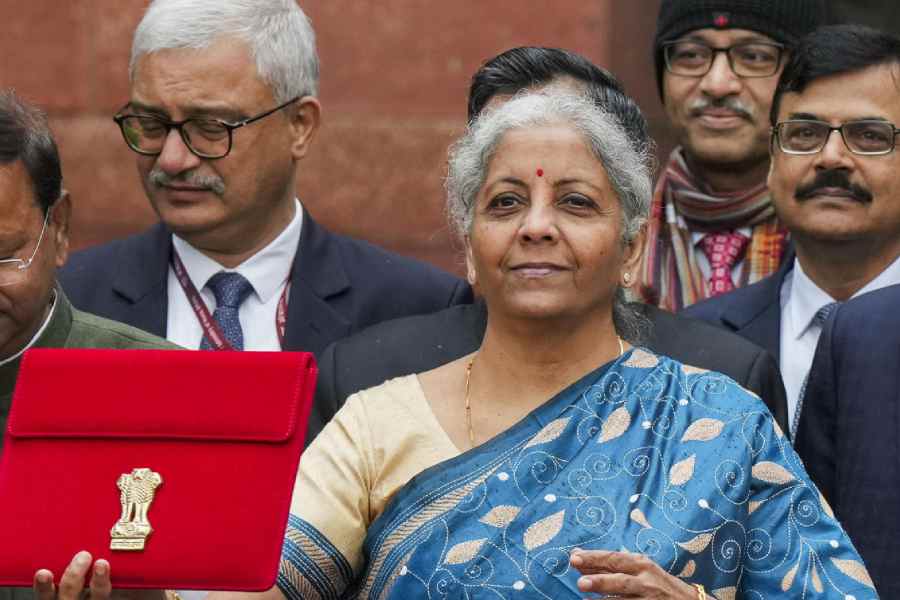The Narendra Modi government has confidently eschewed populism for fiscal rectitude in its interim budget for 2024-25 as it prepares to take on a deeply divided Opposition at the general election later this year.
Finance minister Nirmala Sitharaman chose not to tinker with direct or indirect taxes, refrained from handing out lollies to the poor and other interest groups, cranked up capital expenditure by 11.1 per cent, and lowered borrowing targets in the next fiscal — and still managed to surprise economists by slashing fiscal deficit to 5.1 per cent of the gross domestic product (GDP) from 5.8 per cent in 2023-24.
She said the full budget — which a Modi-led regime expects to present in July — would provide a “detailed roadmap for our pursuit of Viksit Bharat”. The appellation — Viksit Bharat — encapsulates the ambition to join the ranks of advanced nations by 2047.
Sitharaman, presenting her sixth budget, pared subsidies on food, fertilisers and fuel by 7.8 per cent to Rs 3.81 lakh crore in the budget estimate for 2024-25 from a revised estimate of Rs 4.13 lakh crore in the current fiscal.
Markets reacted with aplomb to the announcements.
The 10-year bond yield tumbled to an eight-month low of 7.06 per cent after the government said it would cut its gross borrowings by 8.4 per cent to Rs 14.13 lakh crore, stoking speculation that this could pressure the Reserve Bank of India to think about cutting interest rates as inflation had cooled to 5.69 per cent in December, well within the central bank’s tolerance range of 2-6 per cent.
Sitharaman said the government was ceding space to the private sector so that it could borrow more, which could trigger a virtuous cycle of investment.
The government is also negotiating bilateral investment treaties with foreign partners in the spirit of “first develop India” — a new rubric for the acronym FDI.
The government ramped up outlay for the popular rural employment programme to Rs 86,000 crore from last year’s budget estimate of Rs 60,000 crore. However, this is on a par with the amount that the government expects to spend in 2023-24, as reflected in the revised estimates.
Shilan Shah of Capital Economics said the government’s decision to disavow populism — a break from the practice in 2019 when it launched the Rs 75,000-crore PM Kisan Samman Nidhi that provides Rs 6,000 a year to poor and marginal farmers — “is an indication that the ruling BJP is feeling fairly confident about securing another big victory in the upcoming general election”.
The International Monetary Fund (IMF) has forecast that India will become the third-largest economy in 2027 — and it rankles with the Modi government that the major global credit rating agencies have assigned India a sovereign rating that is just one notch above junk bond status. The government finds it particularly galling that its credit rating ranks a rung below Indonesia's and two notches below Thailand's.
Credit rating agencies like Moody’s and Standard and Poor’s have consistently flagged concerns about India’s fiscal profligacy and its growing public debt.
Sitharaman said: “We will continue on the path to fiscal consolidation… to reduce fiscal deficit below 4.5 per cent by 2025-26. The fiscal deficit in 2024-25 is estimated to be 5.1 per cent of GDP, adhering to that path.”
The government seemed to have pulled a rabbit out of the hat when it claimed to have capped fiscal deficit at 5.8 per cent in 2023-34 — lower than the 5.9 per cent projected in last year’s budget — even though the nominal GDP had shrunk to a little over Rs 296 lakh crore in the first advance estimate put out in early January.
The nominal GDP had been estimated in last year’s budget at Rs 301.75 lakh crore.
The latest budget showed that the government was able to curb fiscal deficit by trimming capital expenditure by over Rs 50,000 crore and cranking up revenue receipts by Rs 67,432 crore.
Moody’s said after the budget that India had not done enough to warrant a rethink of its ratings upgrade. The agency also said the government would have to adopt “proactive” measures for revenue generation to meet the fiscal deficit target of 4.5 per cent of the GDP by the end of March 2026.
Moody’s Investor Services vice-president, Christian de Guzman, acknowledged the effort that the government was making to tame runaway deficits but felt that the emerging spending needs that were not included in the vote-on-account budget could strain India’s ability to meet its deficit target.
Tax demands
Taxpayers were delighted to hear the revenue authorities had decided to withdraw tax demands of up to Rs 25,000 for the period till March 2010 and up to Rs 10,000 for the period 2011-15.
The finance minister admitted that several taxpayers were battling demands that dated back to 1962.
Revenue secretary Sanjay Malhotra said the decision to end these old tax disputes would cost the Centre about Rs 3,500 crore. The decision is expected to help 1 crore taxpayers.
The government will also provide Rs 75,000 crore in 50-year, interest-free loans to states to support their own milestone-linked reforms.
Sitharaman said the government planned to build 2 crore affordable houses over the next five years if voted back to power, adding to the 3 crore already being built.
The government said it would strengthen the electric vehicle ecosystem by supporting the manufacture of EVs and building charging stations.
It also indicated its resolve to encourage the adoption of electric buses for public transport. Sitharaman did not specify the cost or timeline for the project.
Certain tax benefits provided to start-ups and investments made by sovereign wealth or pension funds that are due to expire on March 31 are being extended by a year. Tax breaks on certain incomes of units located in the International Financial Services Centre at GIFT City in Gujarat are also being extended by a year.











